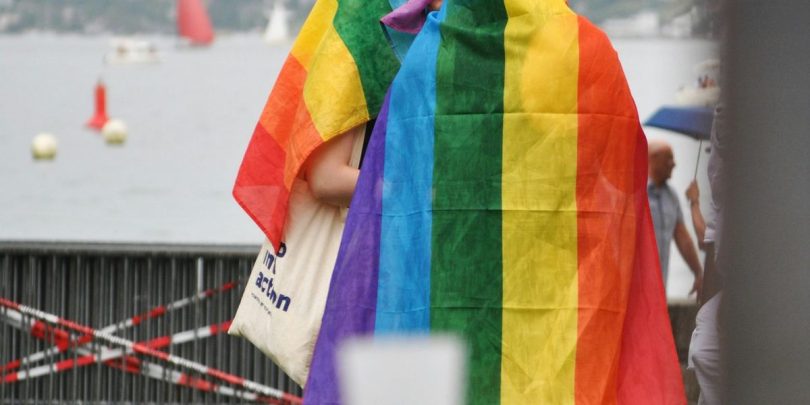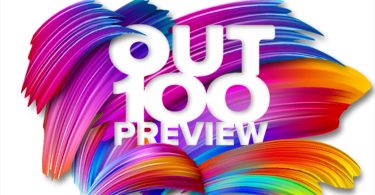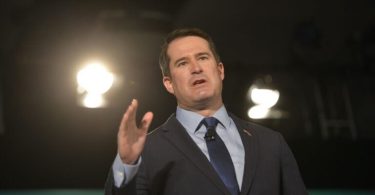There have been many post-mortems looking at how certain minority groups voted—and how they supposedly shifted their vote—but there’s been very little written about one particular minority group: LGBTQ voters.
And yet, in context, LGBTQ voters displayed the kind of influence as a bloc that politicians should be paying attention to moving forward.
I suspect part of the reason they’ve not been focused on is because these voters don’t fit an overwhelming corporate media narrative that positions Donald Trump as having broadened and diversified his coalition—because LGBTQ people actually went the other way.
According to the NBC News Exit Poll, LGBTQ people doubled their share of the electorate, from 4% in 2020 to 8% in 2024, which is nothing to sneeze at. (Researchers have shown the percentage of the LGBTQ population appears to be roughly equal in all of the states.) And 86% of LGBTQ people voted for Kamala Harris—well over 10 million voters—a big increase from the 71% who voted for Joe Biden in 2020.
Donald Trump saw a sharp decline in support from LGBTQ voters, from 25% in 2020 to just 14% in 2024.
It’s true that national exit polls should often be taken with a grain of salt. Sample sizes of minorities are often small. Sometimes other polling of specific groups contradicts the national exit polls’ results.
For example, Matt Barreto of BPS Research told Axios that the exit polls showing a majority of Latino men voted for Trump—somewhere in the 52% to 54% range—were wrong. He said his polling found 56% of Latino men supported Harris, explaining that his polling is more accurate because he had a larger sample size and it was conducted in multiple languages.
Still, his result was less than the 59% that the national exit polls reported Joe Biden winning Latino men by in 2020. So, there was some movement, just not as much as the corporate media suggests. There’s also a lot of discrepancy, depending on which exit poll you look at, about Black male voters and whether they moved slightly toward Trump or not at all.
But regarding LGBTQ voters, the shift in the national exit polling is big enough—and the growth in the percentage of the electorate is large enough—to assume that something happened. While many other groups moved toward Trump a bit—or saw less turnout in some places—LGBTQ people went in the opposite direction.
I believe a few things came into play. The toxic masculinity that marked the Trump campaign was as threatening to lesbian, gay, bisexual, and transgender people as it is to many women. (Harris overwhelmingly won Black women, and, though Trump won white women, Harris did better with white women than Biden did in 2020).
The Trump campaign’s bro culture on steroids, exemplified by the white supremacist elements of Trump’s base as well as among the many young right-wing and even independent male podcasters Trump courted, often telegraphed homophobia and transphobia. Even if it wasn’t overt, it sent a message that you’re not included if you’re queer.
And the blatant anti-trans messaging from Trump and the GOP—and the vicious ads they aired in media markets—horrified almost the entire LGBTQ community.
JD Vance idiotically said during the campaign, in an interview with Joe Rogan, that Trump would probably win what he called “the normal gay guy vote.”
I wouldn’t be surprised if me and Trump won, just, the normal gay guy vote, because, they just wanted to be left the hell alone. Now you have all this crazy stuff on top of it that they’re like, ‘No, no, we didn’t want to give pharmaceutical products to 9-year-olds who are transitioning their genders.
That was evidently very wrong. First off, as far as many in Trump’s base are concerned—including the aggressively anti-LGBTQ Christian right—there is no “normal” gay anything. They believe we’re all abnormal—freaks and sinners. Secondly, the idea that some great majority of queer people—or the “normal gay guys”—would vote for Trump because they were eager to throw trans people under the bus is clearly false.
I’m not saying all cisgender gay, lesbian, and bisexual people support all trans people—there are fissures, as there are in any movement—but I believe most do, understanding the clear connections we have about our bodies and our privacy and about how those who hate us view us.
Beyond that, Trump and the justices he put on the Supreme Court are a threat to marriage equality and anti-discrimination laws protecting gay, bi and lesbian people, especially in public accommodations. Kamala Harris, meanwhile, was marrying gay couples going back to 2004 as a district attorney in San Francisco—before being shut down by the California Supreme Court—and enforced protections as California attorney general while being outspoken as a U.S. senator.
The other thing I would say is that queer people know a fascist when they see one.
They know what it’s like to be scapegoated. And, if they know their history, they know the brutality and violence LGBTQ people experienced in the past at the hands of strongmen. So do Jews, of course, who also voted overwhelmingly for Harris—by 79% in one exit poll—which must have angered Trump, who demanded their vote at rallies and even berated them, claiming they owed it to him for his support of Israel.
Pre-election polling showed a majority of Jewish Americans, who represent a diversity of opinions on the war in Gaza, believed Trump was more supportive of Israel, while they also believed Harris would handle the war better. Whatever their opinions, however, they know a fascist when they see one and voted in big numbers against Trump.
As I wrote a couple of weeks ago, any move to blame transgender people or distance the Democratic Party from LGBTQ rights would be harmful to the party. The media finger-pointing has had some people calling for overcorrections that are not only morally wrong; they’re bad political strategy.
Trump, when all is said and done, will have won the popular vote by roughly 1.5%, the smallest popular vote win in a quarter of a century. The margins were tight in the battleground states. If the issue of inflation and the economy played the role they appear to have, and if the anti-incumbency fervor that gripped the world because of inflation was key, the last thing Democrats should do is push away constituencies that stayed loyal as well as those in the base who support those constituencies’ rights.
At the risk of repeating myself: trans rights and LGBTQ rights in general have galvanized young voters, who embraced equality in elections over the past 10 years and often helped put Democrats over the top. And then there are the families and friends of LGBTQ people.
It’s a polarized time, and elections are going to be very close indefinitely. Having been 8% of the electorate in 2024 and voting 86% for the Democratic presidential candidate, LGBTQ people showed they’re a pivotal and loyal voting bloc that is key for Democrats in any future election.
NOW READ: Democratic leadership missing in action as Trump tightens his grip







